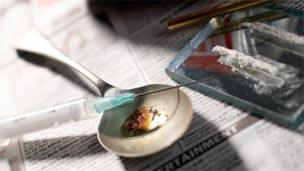Top doctor Sir Ian Gilmore calls for drugs law review
- Published

Sir Ian Gilmore said drug prohibition was "not a success"
Decriminalising drug use could drastically reduce crime and improve health, the outgoing president of the Royal College of Physicians has said.
Sir Ian Gilmore said the laws on misuse of drugs should be reviewed and that their supply should be regulated.
He says he formed his view after seeing the problems caused by dirty needles and contaminated drugs first hand in the patients he has treated.
The government said it did not believe this was the right approach.
In a parting e-mail to 25,000 RCP members, which Sir Ian said expressed his own views rather than those of the RCP, he wrote that he felt like finishing his presidency on a "controversial note".
He endorsed a recent article in the British Medical Journal, external by Stephen Rolles, from the think tank Transform Drug Policy Foundation, which argued that the policy of prohibition had harmed public health, encouraged organised crime and fuelled corruption.
Sir Ian told the BBC: "Everyone who has looked at this in a serious and sustained way concludes that the present policy of prohibition is not a success.
"There are really strong arguments to look again."
Sir Ian said he had had a longstanding interest in the subject, stemming from his work as a liver specialist.
"Every day in our hospital wards we see drug addicts with infections from dirty needles, we see heroin addicts with complications from contaminated drugs," he said.
He argued that many of the problems health staff encountered were the consequences not of heroin itself, but of prohibition.
In his e-mail, Sir Ian wrote: "I personally back the chairman of the UK Bar Council, Nicholas Green QC, when he calls for drug laws to be reconsidered with a view to decriminalising illicit drugs use. This could drastically reduce crime and improve health," he wrote.
In his recent report to the Bar Council, Mr Green said there was growing evidence that decriminalising personal use could free up police resources, reduce crime and improve public health.
Mr Rolles - whose recent BMJ article Sir Ian cited in his e-mail - told BBC Radio 4's Today programme their arguments were "built on a critique of the failure of the last 40 or 50 years".
He said the "punitive criminal justice-driven war on drugs" had delivered the opposite of its goals.
"It hasn't reduced drug use, it hasn't prevented the availability of drugs, but it has created a whole raft of secondary problems associated with the illegal market, including making drugs more dangerous than they already are and undermining public health and fuelling crime."
"That is provoking a debate on what the alternative approaches are and the one that we are calling for is legally regulated production supply."
He said those who found such a proposal difficult to stomach needed to "accept the pragmatic reality that demand for drugs exists now".
"[That demand] will be met one way or another, and we have a choice - we can either leave that supply in the hands of the worse possible people - the illegal market controlled by violent criminal profiteers - or we can control it by appropriate authorities in ways that will reduce the harm that it causes."
He called on the government to look at the evidence and assess the current policy compared with the alternatives, instead of following the "traditional political grandstanding and moral posturing which has characterised drugs policy over the last few decades".
'Extremely harmful'
In a statement the Royal College of Physicians said a joint report in 2000 with the Royal College of Psychiatrists had called for much greater investment in research and in treatment programmes.
The RCP said it was hoping to review the report's findings under its new president, Sir Richard Thompson.
A spokesperson for the Home Office said: "Drugs such as heroin, cocaine and cannabis are extremely harmful and can cause misery to communities across the country.
"The government does not believe that decriminalisation is the right approach. Our priorities are clear; we want to reduce drug use, crack down on drug-related crime and disorder and help addicts come off drugs for good."
- Published17 August 2010
- Published17 August 2010